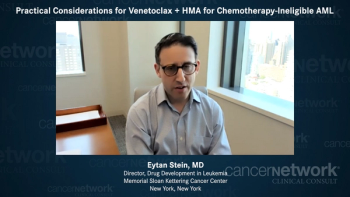
Dr Stein elaborates on some practical considerations for the use of venetoclax and hypomethylating agents for the treatment of patients with chemotherapy-ineligible acute myeloid leukemia.

Your AI-Trained Oncology Knowledge Connection!


Dr Stein elaborates on some practical considerations for the use of venetoclax and hypomethylating agents for the treatment of patients with chemotherapy-ineligible acute myeloid leukemia.
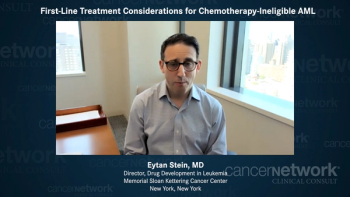
An expert lists the information physicians consider when choosing a first-line therapy for patients with chemotherapy-ineligible acute myeloid leukemia.
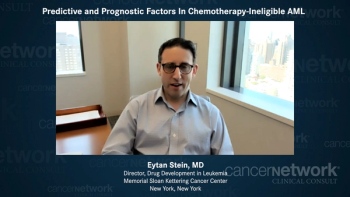
Eytan Stein, MD, discusses the predictive and prognostic factors for patients with chemotherapy-ineligible acute myeloid leukemia.
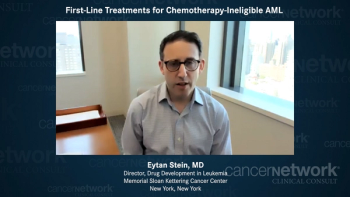
An expert explains the first-line treatment options for patients with chemotherapy-ineligible acute myeloid leukemia.
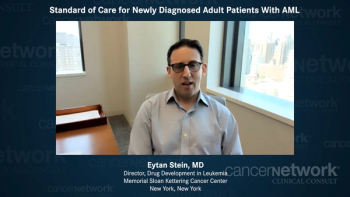
Dr Stein elaborates on the impact of the approval of small molecule inhibitors for the treatment of acute myeloid leukemia.
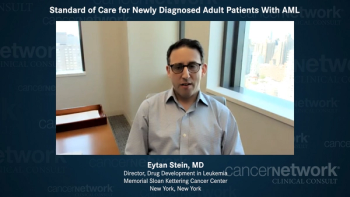
Eytan Stein, MD, discusses the therapeutic standards of care for newly diagnosed adult patients with acute myeloid leukemia.
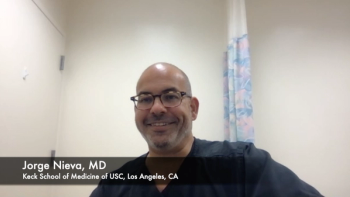
CancerNetwork® sat down with Jorge Nieva, MD, at the 2021 ASCO Annual Meeting to talk about the future of clinical trials for early-stage non–small cell lung cancer.
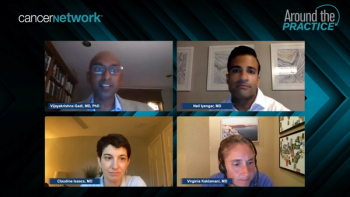
Experts in breast cancer discuss the management of visceral metastases in HER2+ breast cancer, and Vijayakrishna Gadi, MD, PhD, presents the case of a 50-year-old woman with HER+/HR- breast cancer.
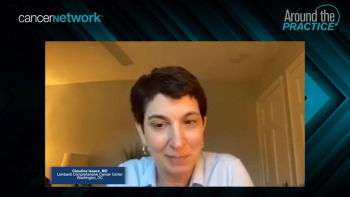
Vijayakrishna Gadi, MD, PhD; Claudine Isaacs, MD; Virginia Kaklamani, MD; and Neil Iyengar, MD, share their approach to treating patients with HER+ breast cancer who have brain metastases.
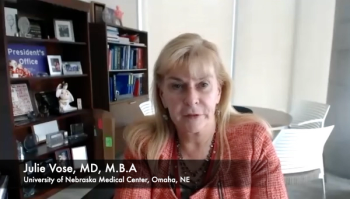
Julie Vose, MD, MBA, a professor of internal medicine in the Division of Oncology and Hematology at the University of Nebraska Medical Center, discusses novel treatment options for patients with hematologic malignancies at the 2021 American Society of Clinical Oncology Annual Meeting.

Julie Vose, MD, MBA, a professor of internal medicine in the Division of Oncology and Hematology at the University of Nebraska Medical Center discussed the benefits of CAR T-cell for patients with follicular lymphoma.

CancerNetwork® sat down with Julie Vose, MD, MBA, at the 2021 American Society of Clinical Oncology Annual Meeting to talk about a clinical trial comparing acalabrutinib versus ibrutinib for patients with chronic lymphocytic leukemia.
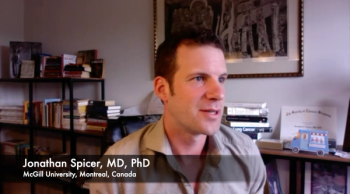
CancerNetwork® sat down with Jonathan Spicer, MD, PhD, at the 2021 American Society of Clinical Oncology Annual Meeting to talk about how communication across a multidisciplinary team was necessary to the success of neoadjuvant immunotherapy administration in CheckMate 816.
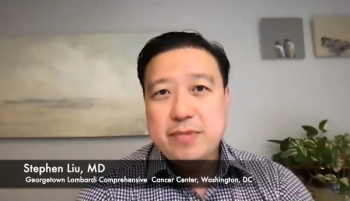
At ASCO 2021, CancerNetwork® spoke with Stephen Liu, MD, about his research on the ARROW trial and how these results might impact the treatment of patients with RET fusion–positive non–small cell lung cancer who are potential candidates for treatment with pralsetinib.
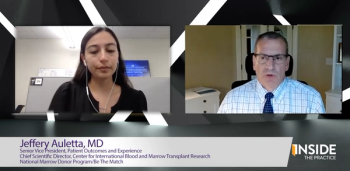
CancerNetwork® spoke with Jeffery Auletta, MD, about how the National Marrow Donor Program/Be The Match is using research initiatives to expand eligibility for stem cell transplants in for patient with acute leukemias and myelodysplastic syndrome.
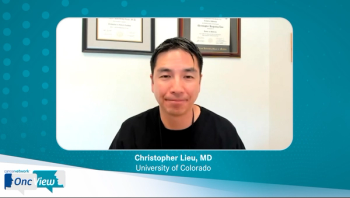
An expert in CRC describes key findings from clinical trials related to personalized detection of molecular recurrence in early stage CRC.
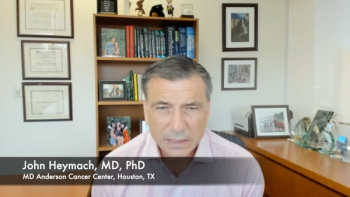
CancerNetwork® sat down with John Heymach, MD, PhD, at the 2021 American Society of Clinical Oncology Annual Meeting to talk adjuvant immunotherapy for recurrence-free survival in resected non–small cell lung cancer.
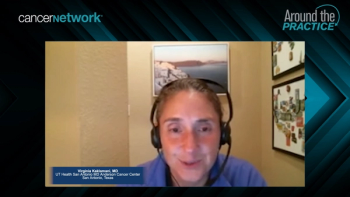
Breast cancer experts review unmet needs in the management of HER2+ metastatic breast cancer and updates from the 2021 ASCO virtual meeting.
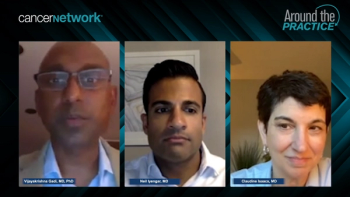
Neil Iyengar, MD, leads the discussion on the current standard of care and the sequencing of therapy for HER2+ metastatic breast cancer.
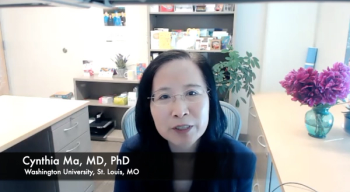
Cynthia Ma, MD, PhD, explains key efficacy findings regarding HER-targeted therapy to treat patients with HER2-mutant breast cancer.
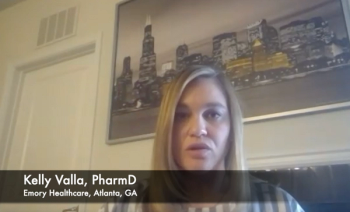
An oncology pharmacist talks secondary malignancies noted with tazemetostat in the treatment of follicular lymphoma.

Javier L. Munoz, MD, MS, FACP, discusses how the sequencing of therapies has changed in the last year.
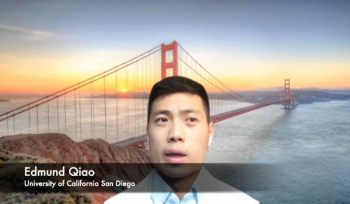
CancerNetwork® sat down with Edmund Qiao at the 2021 American Society of Clinical Oncology Annual Meeting to talk about prostate-specific antigen screening and prostate cancer prevention in African American men.

At ASCO 2021, Stephen Liu, MD, discussed his excitement for results of the IMpower010 trial of atezolizumab in patients with early-stage resected non–small cell lung cancer

Tazemetostat use only requires dosing modifications in a small percentage of patients, according to an oncology pharmacist.

Eric J. Sherman, MD, highlights several drugs that are being used to treat RET-positive thyroid cancer.

Eric J. Sherman, MD, examines the phase 3 COSMIC-311 trial with cabozantinib in radioiodine-refractory differentiated thyroid cancer.
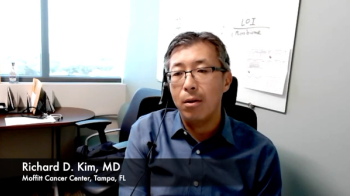
CancerNetwork® sat down with Richard D. Kim, MD, of the Moffitt Cancer Center at the 2021 ASCO Annual Meeting to talk about the many ways oncologists can approach treating hepatocellular carcinoma with combination regimens.
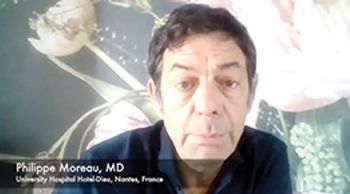
Moreau discussed conclusions drawn from part 2 of the CASSIOPEIA trial and the need for further follow-up with bortezomib, thalidomide and dexamethasone plus maintenance daratumumab in newly diagnosed multiple myeloma.

Adverse effects in patients taking tazemetostat were manageable, with most patients reporting low-grade fatigue, pain, and nausea.